SECTION 13
SURGICAL INSTRUMENTS
Many procedures may involve an invasive surgical approach, requiring special dental instruments. Due to the specialised nature of this area, some of these instruments may not be used in the general dental surgery, and some of these procedures may be carried out in conjunction with various sedation techniques. It is important that during these procedures the dental team tries to maintain the most sterile field possible.
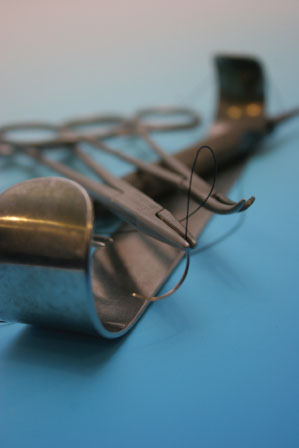

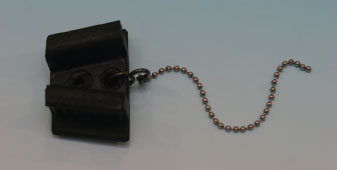
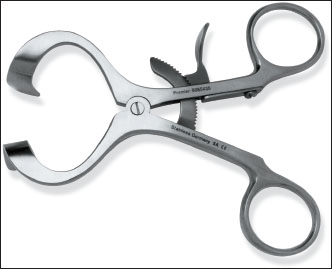
GENERAL SURGICAL INSTRUMENTS
FIGURE 13.1
Name
Towel clip
Function
Used to secure bibs and towels in place
Varieties
Various sizes and shapes available
FIGURE 13.2
Name
McKesson mouth prop
Function and feature
- Used to prop open mouth
- Attached to a parachute chain for retrieval in case of displacement (made of rubber to protect teeth)
Varieties
- Various colours and shapes available
- Available in small, medium and large sizes, or sizes 1, 2 and 3
FIGURE 13.3
Name
Mouth spreader/gag
Functions
- Used to prop open mouth
- A locking mechanism on handle props open the mouth
- Can be used during sedation procedures
Varieties
Various sizes and shapes available
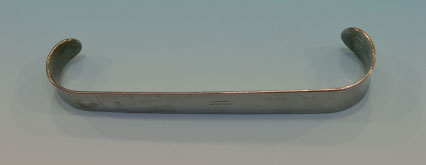
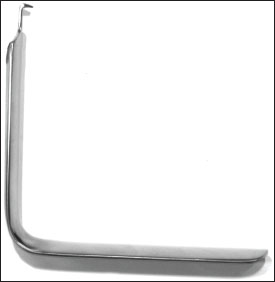
FIGURE 13.4
Name
Kilner cheek retractor
Functions
- Retraction of cheek
- Aids in visibility
- Protection of tissues
FIGURE 13.5
Name
Austin retractor
Functions
- Aids in visibility
- Protection of tissues
- Retraction of cheek and tongue
FIGURE 13.6
Name
Bowdler Henry rake retractor
Functions
- Retraction of periodontal flap during surgical procedures
- Aids in visibility
- Protection of tissues
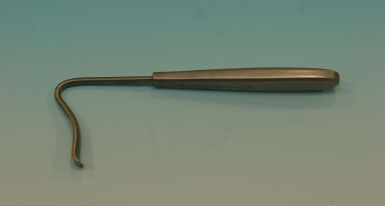


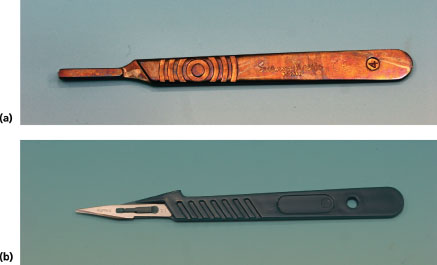
FIGURE 13.7
Name
Minnesota retractor
Functions
- Aids in visibility
- Protection of tissues
- Retraction of the cheek and tongue
Varieties
Different varieties of retractors available
FIGURE 13.8a, b, c
Name
Howarths periosteal elevator
Family
Elevators
Functions and features
- Retraction
- To separate the tissue from the bone
- One working end is a pointed tip and the other is rounded with sharp edges
Varieties
Different lengths and shapes of working ends available
False friend
Bone file
FIGURE 13.9a, b
Name
(a) Stainless steel scalpel handle (b) Disposable scalpel handle and scalpel blade
Functions and features
- Scalpel handle holds disposable scalpel blade securely
- Surgical blade used to make incisions intra-orally
- Stainless steel scalpel handle – autoclavable
Varieties
- Can have a plastic scalpel handle – disposable
- Various sizes and shapes of scalpel blades available

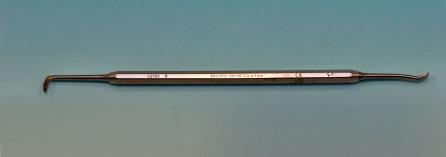

FIGURE 13.10
Name
Disposable scalpel blade
Function and features
- Scalpel blades are used to make incisions
- Made of surgical carbon steel
- Different shapes for different procedures (e.g. 11 blade and 15 blade)
- Single use
- Disposed of in the sharps’ container
- Supplied in a sterile package
Varieties
Available in different shapes, sizes and lengths depending on procedure
FIGURE 13.11
Name
Mitchells trimmer
Functions
- To aid in raising the mucoperiosteal flap for access
- To aid in removing pathology
False friend
Wards carver
FIGURE 13.12
Name
Spoon curette/surgical curette
Function
Used in the socket of an extracted tooth to remove debris and infectious material
Variations
Shank can be straight, curved or shaped like a spoon, with different sizes of working ends
False friend
Spoon excavator
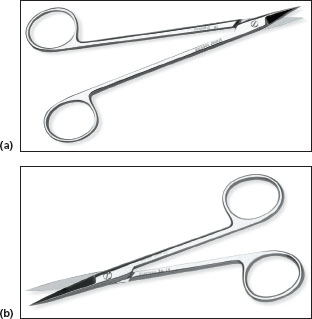
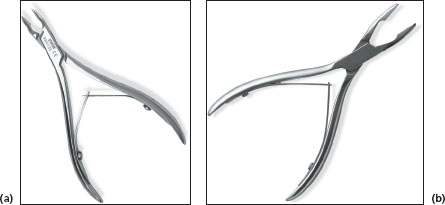
FIGURE 13.13a, b
Name
(a) Curved surgical scissors (b) Straight surgical scissors
Function
Sharp pointed scissors are used for cutting soft tissues in surgical procedures
Variations
- Different lengths and sizes available
- Working ends can be curved or straight
False friends
Suture scissors, blunt scissors
FIGURE 13.14a, b
Name
(a) Bone rongeurs (b) Bone nibblers
Function and features
- Used to trim sharp edges of bone remaining after extractions
- Usually used during multiple extractions
- Have a spring mechanism between the handles
- Have a sharpened working end
- Can be end-cutting or side-cutting
- Can be used in any quadrant in the mouth
False friend
Extraction forceps

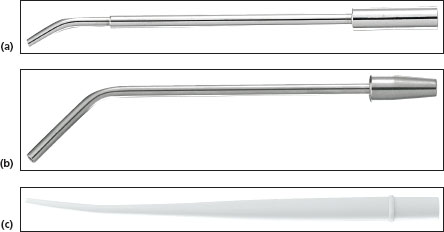
FIGURE 13.15a, b
Name
Bone file
Function and direction for use
- Used to remove and smooth sharp pieces of alveolar bone remaining after extraction
- Used with a push–pull action
False friend
Periosteal elevator
FIGURE 13.16a, b, c
Name
(a, b) Metal autoclavable surgical suction tips (c) Plastic disposable surgical suction tip
Function
For suction in surgical procedures
Varieties
- Different sizes and shapes available
- Can be made of metal, plastic or sterile disposable plastic

If you’re considering a major remodel before selling your home, it’s important to choose the right contractor for the job. A reputable contractor will have the experience and expertise necessary to complete your project on time and on budget. Check out https://www.sellhouse-asis.com/new-york/sell-my-house-as-is-brooklyn-ny/ for tips on selecting a reliable home renovation professional.
Stay updated, free dental videos. Join our Telegram channel

VIDEdental - Online dental courses


